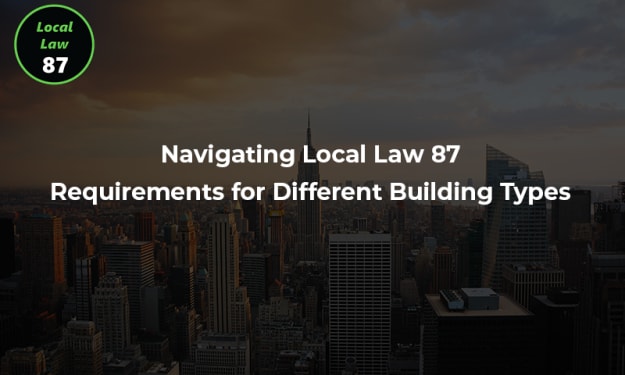The Implications of Local Law 97 on New York City's Carbon Emissions
Local Law 97 Nyc

New York City, one of the most populous and vibrant cities in the world, has long been at the forefront of environmental initiatives and sustainability efforts. In line with its commitment to combat climate change and reduce greenhouse gas emissions, the city enacted Local Law 97 (LL97) in 2019. LL97, officially known as the Climate Mobilization Act, is a groundbreaking legislation that aims to drastically reduce carbon emissions from buildings, which are responsible for a significant portion of the city's overall greenhouse gas emissions. This article explores the implications of Local Law 97 on New York City's carbon emissions and highlights the role of companies like The Cotocon Group in providing sustainability consulting to help businesses comply with this transformative legislation.
Understanding Local Law 97
Local Law 97 is a key component of New York City's ambitious plan to reduce its carbon emissions by 80% by the year 2050. The legislation specifically targets buildings over 25,000 square feet, which account for nearly 50% of the city's total emissions. These buildings are required to meet specific carbon emissions caps based on their occupancy class. The law establishes emission limits per square foot of the building and imposes penalties for non-compliance.
Implications for Carbon Emissions
Local Law 97 is expected to have a profound impact on New York City's carbon emissions. By setting strict emission limits, the legislation encourages building owners and managers to adopt energy-efficient technologies and implement sustainable practices to reduce their carbon footprint. The law aims to drive significant improvements in building energy performance, resulting in reduced energy consumption and greenhouse gas emissions.
Furthermore, LL97 encourages the adoption of renewable energy sources and incentivizes the implementation of renewable energy systems within buildings. This approach promotes the transition to cleaner energy and reduces reliance on fossil fuels, further contributing to carbon emission reductions in the city.
Challenges and Opportunities for Building Owners
While Local Law 97 presents significant challenges for building owners, it also opens up opportunities for innovation and sustainable development. Compliance with the emission limits can be a complex and costly endeavor, especially for older buildings that require extensive retrofits. However, it also creates a market demand for energy-efficient technologies and services, spurring job creation and economic growth in the green sector.
The Role of Sustainability Consulting
Companies like The Cotocon Group play a crucial role in helping building owners and managers navigate the complexities of Local Law 97 and achieve compliance. As a sustainability consulting firm, The Cotocon Group specializes in providing tailored solutions to assist businesses in meeting their environmental goals and legal obligations. Their team of experts offers comprehensive assessments, energy audits, and strategic guidance to develop and implement sustainable practices that align with Local Law 97 requirements.
The Cotocon Group's Approach to LL97 Compliance
The Cotocon Group takes a holistic approach to LL97 compliance, working closely with building owners to develop customized strategies for reducing carbon emissions. Their services encompass energy benchmarking, identifying energy-saving opportunities, recommending energy-efficient technologies, and assisting with the necessary documentation and reporting.
By leveraging their expertise and industry knowledge, The Cotocon Group helps clients implement energy-saving measures, such as upgrading building systems, improving insulation, optimizing HVAC systems, and integrating renewable energy solutions. These initiatives not only help clients achieve LL97 compliance but also result in long-term energy cost savings and enhanced building performance.
Beyond Compliance: Benefits of Sustainability
Complying with Local Law 97 is just the beginning. The Cotocon Group emphasizes the broader benefits of embracing sustainability beyond regulatory requirements. By adopting energy-efficient practices, buildings can improve indoor air quality, enhance occupant comfort, and increase property value. Sustainable buildings also enjoy a competitive edge in attracting tenants and investors who prioritize environmental responsibility.
Conclusion
Local Law 97 is a significant step towards reducing New York City's carbon emissions and combating climate change. The implications of this legislation are far-reaching, influencing the energy performance and sustainability practices of large buildings throughout the city. Companies like The Cotocon Group are instrumental in helping building owners and managers navigate the complexities of LL97 and achieve compliance. By providing sustainability consulting services, The Cotocon Group supports the transition to a greener future while maximizing the benefits for their clients. As New York City progresses on its path towards a more sustainable future, Local Law 97 stands as a testament to the city's commitment to environmental stewardship and serves as a model for other urban centers worldwide.
About the Creator
The Cotocon Group
Sustainability Consulting Experts in NYC. Leading the Real Estate Industry in Reducing GHG Emissions & Increasing Property Value.
Website :- https://www.thecotocongroup.com






Comments
There are no comments for this story
Be the first to respond and start the conversation.